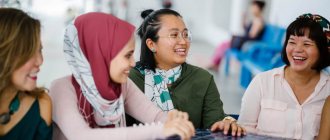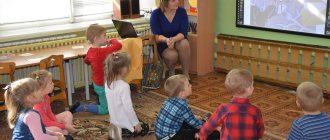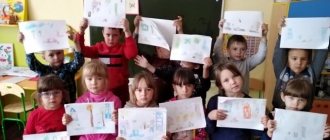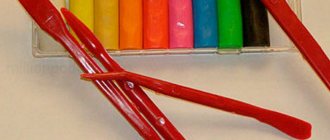Summary of NOD in the preparatory group “In the Land of Tolerance”
Summary of educational activities in the preparatory group
“In the Country of Tolerance”, educational area “Socialization”
Prepared by:
Kochetkova E.V.
Group:
preparatory
Program content: Purpose.
Continue to reinforce the idea that planet Earth is a home for all people to love.
Objectives:
To consolidate the idea of the individual characteristics of other people (children). To promote tolerance, respect and tolerance for people regardless of race, language, gender. Objectives: Continue the formation of communication abilities in children through the use of information and communication technologies (ICT) Strengthen the understanding of the individual characteristics of other people (children). To promote respect and tolerance for people regardless of their nationality, language, or religion.
Materials:
Screen, projector, flower with petals (with written words), proverbs, ball, stereo system
Progress of joint activities:
The teacher and the children enter the hall, the children stand in a circle and say the words I am your friend and you are my friend.
Let's hold hands together and smile at each other! (Hold hands and look at each other with a smile). Educator: The guys came to visit us today. Let's smile at the guests, say hello and get down to business. The teacher and children say the words: - Good afternoon! - We told you, - Good afternoon! -You said. How two strings were connected - Warmth and kindness. After the greeting, the children and teacher sit on chairs and the first slide with the poem appears. 1. SLIDE Ya. Akim There is one planet - a garden In this cold space Only here the forests are noisy, calling migrating birds. Only on it alone do lilies of the valley bloom in the green grass, and only here do dragonflies look into the river in surprise. Take care of your planet - After all, there is no other like it! Educator:
-What kind of planet is this that is mentioned in the poem?
Children's answers
. (The poem talks about our planet Earth).
Educator:
-Guys, who can see our planet in all its glory?
Children's answers
: -Cosmonauts.
Educator
: -Can you and I see our planet?
Children's answers. Educator
: -You and I can look at the model of the Earth.
Educator
: -Who can tell what it’s called?
Children's answers (The model of the earth is called a globe) (showing the globe) Educator
: - What can you see on it?
Children's answers: (you can see seas and oceans, continents on it) Educator
: -Who inhabits our planet?
Children's answers (people, animals, plants, etc.) Educator
: - Guys!
Today we will go on a journey through the “Land of Tolerance” Educator
- Tolerance.
What it is? Children's answers (good, kind attitude towards all people) Slide with a poem.
Tolerance.
What's happened? If anyone asks me, I will answer - this is everything earthly, That on which the entire planet stands. Tolerance is people of light, of different nations, faiths and destinies, discovering something, somewhere, rejoicing together. No need. Fear that you will be offended by People of the color of blood that is not yours, Fear that you will be humiliated by People in your native land. After all, our dear planet Loves all of us, white and colored. We will live, respecting each other, Tolerance is a word for the living. Educator
: - You know guys, so that people always remember these words and do good deeds, in many countries around the world the International Day of Tolerance is celebrated on November 16th.
Educator
: - I ask the girls to stand up.
Educator
: - Now please stand up, boys.
Educator
: - Please, guys, who has dark hair, and now who has blond hair, please stand up?
Educator
: - Think and say: “What are we all like?”
Children's answers (we are all different) Educator
: - Why are people different?
- How are we different? (shape of face, nose, cheeks, skin color, eyes, hair) Educator
: -Why are people from different countries so different from each other?
Children's answers (People live in different parts of the world). Educator
: -Do you know why this is so?
Let's look at the world map, did you answer correctly (Children look at pictures of people of different races on the slides) Q: - We are all different, but we are together, and we are all equal. Educator
: - Now let's remember the good qualities that you know in each other.
Let's stand in a circle and, passing the ball, we will name these qualities. Game “Compliments”
Q: - What do you think it means to be Tolerant?
Expected answers from children (to be kind, good) Educator
: - Guys, I brought you a flower of tolerance, but along the way it crumbled.
Can you help me assemble it? Game “Flower of Tolerance”
Petals with words are distributed (compassion, mercy, forgiveness, respect for human dignity, acceptance of others, kindness, anger, rudeness, fighting, cooperation, respect for the rights of others)
Educator
: - Look what words are written on the petals What petals are like you Do you think they suit our flower of tolerance?
Children choose those petals that match the flower. Educator
: - What do these words have in common?
Children's answers (these are good words) I attach the middle on which the word tolerance is written. Educator
: - And why don’t the remaining petals fit?
Children's answers. (These words are about bad deeds) Educator
: -Today we will go on a journey on a magic train.
Traveling through the Land of Tolerance, we will relax, play, and most importantly, learn to give people joy, be friendly, and attentive. The train signal sounds (children imitate the movement of the train). Educator
: - And there’s a city ahead. And to find out what it is called, you need to guess the riddle. Often you make it for people, and they make it for you. You have it in your soul, but you can’t find it anywhere. (Welcome)
Educator
:- So, what is the name of our first city?
(Dobro) And in the city of Dobro the first test awaits us, and if we are friendly and help each other, then we will cope with them. Educator
: - The main theme of fairy tales was and remains the struggle between good and evil.
I will name the fairy-tale hero, and you will answer what he is like. If you are kind, you clap your hands joyfully, and if you are evil, you stomp your feet. Ivan Tsarevich, Koschei the Immortal, Goldfish, Thumbelina, Karabas Barabas, Cinderella, Little Red Riding Hood, Geese-Swans, Merman, Baba Yaga, Morozko, Malvina. Educator
: - Guys, when people come to visit each other, or meet on the street, what do they say? Of course you need to say hello. Every well-mannered person should say hello. I want to tell you and show you how they greet each other in different countries.
Game "World Greetings" (slide show)
Russia – a hug and three kisses alternately on both cheeks.
China - light bow with arms crossed on the chest. France - handshake and kiss on both cheeks or Kiss, touching each other's cheeks alternately and sending one to five kisses into the air India - light bow, palms extended in front of the forehead. Japan - a slight bow, arms and palms extended at the sides Germany - a simple handshake and a look into the eyes. The Eskimo tradition is to rub noses against each other. Arabs - cross their arms over their chest; Samoans - sniff each other. Educator
: - And now, on command, when I say: “Hello,” you all say hello together in the way you like best.
Educator
: - Okay, we passed this test.
A signal sounds (children imitate the movement of a train) on the screen a slide with a train is replaced by a slide of the city of “Wise Men”
Educator:-
You and I found ourselves in the city of the Sages.
I will read the beginning of the proverbs, and you will continue it. •Good deeds make a person beautiful. • Hurry to do good. • Life is given for good deeds. • Good is paid for with good. Educator
: - Well done, you coped with this task!
Educator
: - And now, so that we can rest, we’ll do some physical education for the eyes.
Look at the screen and follow the insects with your eyes . (On the screen there are slides with a physical education lesson)
Well done, our eyes have had a rest, let's hit the road further!
A signal sounds (imitation of a train movement) on the screen, a slide with a train is replaced by a slide of the city “Good Deeds”
Educator
:- Attention city “Good Deeds” Guys, to complete this task you need to split into pairs.
Couples, sit down on the carpet! I will give each pair a picture that shows children committing intolerant (bad) acts. Discuss what the children are doing wrong and decide what to do!” Educator
: - Guys, you have completed this task!
Go ahead. A signal sounds (children imitate the movement of a train) on the screen a slide with a train is replaced by a slide of the city of “Magic Words.”
To
the teacher
: - We have arrived in the city of “Magic Words.”
We need to complete all the tasks in order to move on. Every polite and well-mannered person says words that we call “magic”. Guys, listen to the poem, guess, and tell me what “magic” word should be said. Game “Give me a word”
Even a block of ice will melt from a warm word... (Thank you) An old tree stump will turn green when it hears... (Good afternoon) The boy is polite and developed, he says, when meeting,... (Hello) When we are scolded for pranks, we say:... (Please forgive me) Both in France and Denmark they say goodbye when they say goodbye: ... (Goodbye)
Game “Please” Educator: -
I will give you various tasks, and you will have to complete them only if I The task is to say the word “Please”.
If this word is not there, do not complete the task. All clear? Let's try. Be very careful. Game "Please" • Please stand up. • Raise your right hand. • Please raise your left hand. • Kindly sit down. • Please clap. • Stomp. • Please smile! Educator
: - and we completed this task!
Forward! The song “Blue Car” plays (imitation of the movement of a train); on the screen, the slide of the train is replaced by the slide of the city “Zagadok”. Educator:
- Our journey continues, and we find ourselves in the city of “Riddles”. I will ask you riddles. If the riddle is about kindness and politeness, then in response to it you need to say in unison: “This is me, this is me, these are all my friends!” and clap. If the riddle is about what you can’t do, keep silent and drown. Game “This is me, this is me, these are all my friends!” Who among you, waking up cheerfully, will say good morning firmly? (Answer) Tell me, brothers, which of you forgets to wash your face? How many of you have your bag, books and notebooks in order? How many of you on a cramped tram give up a seat to older people? How many of you are silent like a fish instead of a kind “thank you”? Who wants to be polite and doesn’t offend kids?
A signal sounds (imitation of train movement) and on the screen the slide with the train is replaced by a slide of the “TOLERANCE” square
To
the teacher
: - Well done, guys. Well done. Our journey is coming to an end. It ends in the main square of the Land of Tolerance.
"Multi-colored globe"
If only white flowers bloomed in the field, you and I would soon get tired of admiring them.
If only yellow flowers bloomed in the field, you and I would become bored by such beauty.
It’s good that there are daisies, Roses, asters, cornflowers, Dandelions and porridge, Forget-me-nots and frying!
It’s good that people are different in eye and skin color. How beautiful is the colorful world, the multi-colored globe! A. Shlygin
As a caregiver
:- Guys, what qualities do you think a person living on planet Earth should have?
We don’t know where this person lives, how old he is, what nationality he is. He's just a man. Children's answers (Polite, kind, good, smart, brave, honest To the teacher
: - What can we do so that peace always reigns in our country? Children's answers (Be friends, do not swear, speak polite words) To
the teacher
: - A person is born and lives on earth in order to do good to people. The earth is our common home and it will depend on you and me whether we save this world or not. Let's stand in the circle of tolerance. Now put your right hand on the shoulder of the person on the right - this means that you you have a friend who you can lean on. With your left hand, hug the person on your left - this means that you are ready to support each other. And we will all listen to the song together. The song “Let's be friends” is playing. To
the teacher
. - Thank you everyone! I wish you goodness, sincerity and understanding between each other. Well done!
7
Planning Tolerance Week in kindergarten
The implementation of Tolerance Week is discussed and approved by pedagogical councils, usually in 2 stages:
- Voicing current tasks for promoting tolerance in kindergarten, discussing the start date of Tolerance Week, identifying possible events.
- Submission of an action plan (from educators, social pedagogue and psychologist, music and physical education directors) and approval of the Tolerance Week program.
Traditionally, Tolerance Week is held in kindergartens and schools in November - before the International Day of Tolerance (November 16).
Tolerance Week in kindergarten involves unusual activities and events:
- classes in a non-traditional form (game, integrated), including using ICT (information and computer technologies),
- musical holiday: children prepare numbers with national dances and songs together with a music director and a choreography teacher,
- short-term projects or the final event for a long-term project,
- physical education leisure: a day of folk games and outdoor activities,
- competition of drawings, crafts, motivational posters,
- master classes for parents.
As part of the Tolerance Week, child-parent events are held at the preschool educational institution
Table: example of planning for Tolerance Week
| date | Event | Participants | Responsible, organizers |
| 12.10 | Making posters and wall newspapers on the theme “Friendship of Peoples”, placing materials in the hall and recreation areas of preschool educational institutions. | Preschoolers of all ages together with parents and educators. | Teachers, senior teacher. |
| Integrated lesson “There are very different children on this huge planet.” | Pupils of the first and second junior groups. | Teachers and music director. | |
| Consultation for parents “Cultivating tolerance in modern society.” | Parents of middle, senior and preparatory groups. | Social educator, psychologist. | |
| 13.10 | Joint activity with parents “Educating tolerance through fairy tales.” | Parents and children of middle and senior groups. | Educators. |
| Physical education leisure “Moveable folk games”. | Younger preschoolers. | Physical education director. | |
| 14.10 | View a presentation and cartoon on the topic “What is tolerance?” | Pupils of the senior and preparatory groups. | Senior teacher, psychologist. |
| Musical leisure “Dances of the peoples of the world” (with master class). | Parents and pupils of junior and middle groups. | Educator, choreography teacher. | |
| 15.10 | Physical education “Sport unites countries and peoples.” | Pupils of middle, senior, preparatory groups. | Physical education director. |
| Exhibition-competition of crafts and drawings “The Magical Land of Tolerance”. | All preschool pupils (younger ones - together with parents and group work). | Teachers, head of the art group. | |
| 16.10 | Festive concert dedicated to Tolerance Day. | All preschool pupils. | Musical director, senior teacher, director of the theater studio. |
There may be several festive events (concerts) planned - for younger, middle and older pupils. This organization gives each group the opportunity to express themselves creatively and invite parents as spectators.
Video: celebration of Tolerance Day in the senior group
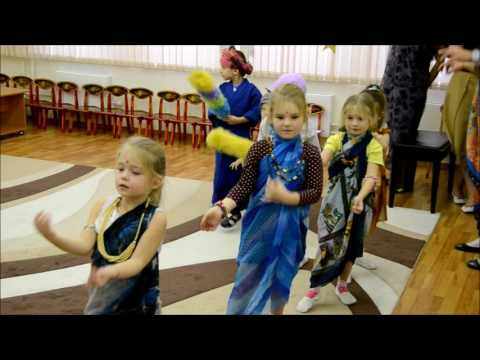
The most interesting and exciting thing about concerts and celebrations during Tolerance Week is the opportunity to try on the national costumes of residents of distant countries. It is recommended to involve parents in the production of attributes and elements of national clothing.
Lesson on teaching tolerance in kindergarten
Classes on tolerance in kindergarten are held in different forms, they are united by the theme of kind attitude towards others. In younger groups, the word “tolerance” itself is not heard in conversations with students; with kids they talk about friendship, fair treatment of others, and good deeds. For children 2–4 years old, classes are often organized integrated - with songs, dances, games, and simple creative tasks. Older preschoolers develop the ability to concentrate for a long time: they can thoughtfully study photographic materials and maps. The level of analytical skills allows children 6–7 years old to make assumptions and draw conclusions. Therefore, in the senior and preparatory groups, NED (direct educational activities) classes are devoted to the topic of tolerance.
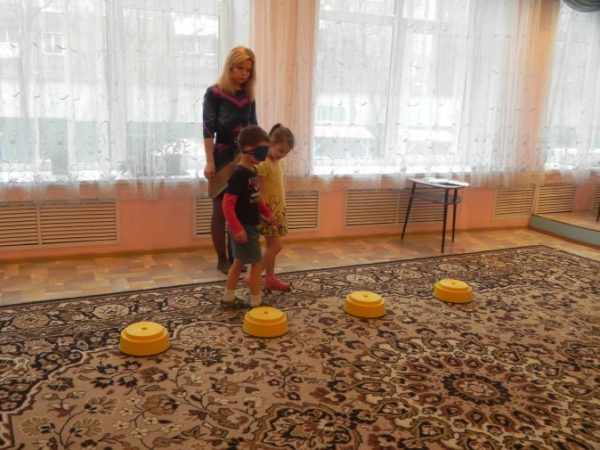
Playing out situations in which it is necessary to help a neighbor develops empathy and kindness in children
Classes on education of tolerance are held infrequently; it is recommended to include them in calendar and thematic planning several times during the school year (for example, in November, January and April). The structural elements of the lesson are flexible: the teacher plans the forms and order of work taking into account the specific group so that the lesson is effective. A mandatory element is the reflection stage at the end of the lesson. It is necessary to sum up the results with the children (the older ones do this on their own), give them the opportunity to express themselves - what they liked about the lesson, what it inspires them to do, whether they would like to learn more about tolerance.
Unfortunately, not all educators include classes on developing tolerance in their work planning. The garden holds an annual Tolerance Week, but this is not enough. It is necessary to return to the topic of national tolerance regularly in the educational process - this is a condition of modern life.
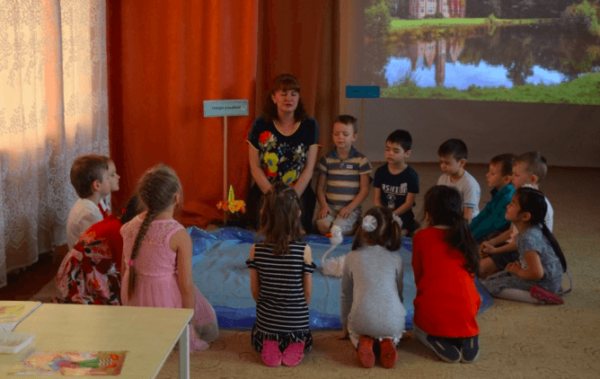
The game exercise “Lake of Kindness” teaches children ways to relax and encourages them to think about good deeds
Lesson duration
According to SanPiN standards, the time frame for classes on developing tolerance is the same as for classes on educational activities:
- first and second junior groups - no more than 15 minutes,
- middle group - 20 minutes,
- senior group - 25 minutes,
- preparatory group - 25–30 minutes.
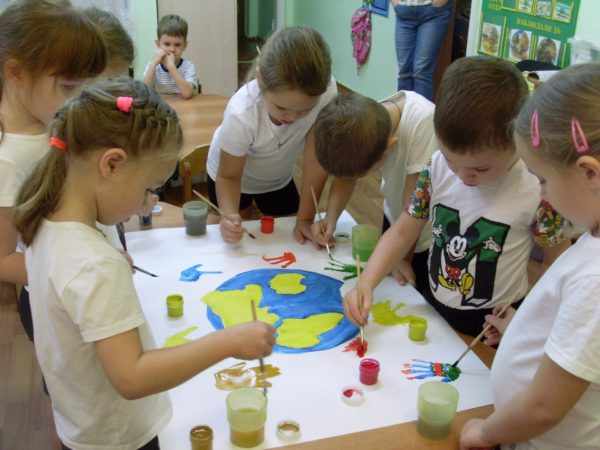
A lesson with older preschoolers lasts 25 minutes, during which time students can draw and present a collective poster
Table: time plan for the lesson “Pass the good in a circle” in the younger group
| Lesson stage | Organizational moment, motivating beginning (surprise moment) | Educational conversation | Medium mobility game | Creative task (“Drawing a rainbow”) | Summing up the lesson |
| Duration | 2 minutes | 3–4 minutes | 3 minutes | 4 minutes | 1 minute |
